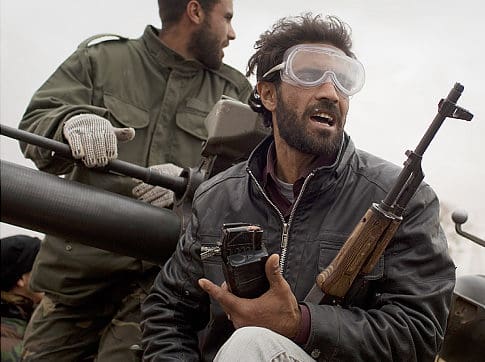Why is the international media so captivated by events in the Middle East? The various countries’ efforts to overthrow their governments (read: “autocratic dictators surrounded with friends with official titles”) are certainly compelling narratives. But you can log this under la plus ca change, la plus la meme chose (a.k.a., same old, same old). The coverage has reached such obsessive levels that the “Arab Spring” is starting to sound like Springtime for Hitler. Not that I’d want that to happen. My heart beats a little faster for the Libyan rebels, who seem close to winning freedom from decades of ruthless dictatorship. Before we begin congratulating them, though, NPR reveals that the new government may be taking steps to eliminate any possibility of the kind of resistance that brought them to power in the first place . . .
Even though Gaddafi and Friends are still on the loose and calling for loyalists to keep fighting, the transitional government is already stating that “those [rebel] youth must assure the world that they will lay down their arms as soon as the conflict ends.”
The chief spokesman for the rebel transitional council goes on to ask what use anyone would have with automatic weapons. Apparently, private gun ownership is not, historically, a traditional Libyan cultural value.
And so The New Boss will offer cash incentives to convince “rebels” to turn in their arms voluntarily. Ultimately, unsurprisingly, the anti-Gaddafi forces will use “the full force of the law” to forcibly disarm Libyans who resist.
The new Libya are sending the clear message that the right of self preservation belongs to the people in power. Again. Still. It’s a tragedy in the making; the chances that the new Libyan leaders will benevolently dispense law and order to an unarmed populace are almost as great as they were under Gaddafi. Very, very low.
In the U.S. we have political leaders who, by and large, don’t want to enslave the American people. Yet we wouldn’t dream of entrusting our pols with un-checked power. I’m amazed that people would willingly bounce from one oppressive regime to another. Are they willing? Is Libyan culture so different to ours that they can’t see that the wisdom of Wayne LaPierre’s warning that “whoever holds the guns makes the rules”?
If the proposed disarmament laws go into effect, we’ll see the answers soon enough. Or, perhaps, too soon.





the chances that the new Libyan leaders will benevolently dispense law and order to an unarmed populace are almost as great as they were under Gaddafi. Very, very low.
Western-style democratic systems will not work among people who believe that “freedom” is anti-Islamic.
The old carrot and stick strategy.
First the good Libyans will be swayed buy cash, buy back if you will.
But then there are the “trouble makers” who for frivolous, if not evil reasons will try to hold on to what they have.
Seems the new boss is just like the old boss, springtime or not.
Libya is in a part of the world that’s rather known for rebellions that morph into bands of armed thugs permanently roaming the landscape. I would tend to suspect these measures are aimed at demobilizing the rebel army and transitioning back to a peaceful normalcy.
I think it is time that Wayne LaPierre formed the Libyan branch of the NRA. :>) It only took 42 year to overthrow Gaddafi who came to power in a revolt and then “ensured” his power by disarming the people and most of the Army. What was that old saying “He who forgets the past is doomed to repeated it”. I can tell you now that as long as the oil flows Eurpoe will not care what the new government does to stay in power. Just my 10 cents. Feedback?
No surprise here. Did anyone really expect any different? An Islamic state can never be conducive to true individual freedom; the two ideals are oil and water.
what i can’t believe is that we are not tying aid to this trash pit to the extradition of the lockerbie bomber, there are even left wing senators calling for this.
i get the feeling that we are gonna have to go back and club this governemnt over the head eventually, they have already displayed their total lack of appreciation for our military assistance.
Normally, I’d be right there with you on the disarmament issue, but I think Id need to dissent in this instance.
Yeah, the rebels have done a huge service – we think, so far – for Libya, and now Libya may at long last become a decent place for decent Libyans to live.
But they need to transition now to an orderly civil society centered on the consent of the people and free of coercive interests. At their shakiest time, just as they are beginning, they already face a number of those coercive interests looking to jump in and impose on Libya their own ideas and plans. So, for Libyans, this promises to be an uphill battle.
And I can say for certain that, if I were trying to design a workable model for the new society, I would NOT put down as a step in my plan “provide free and loaded automatic weapons to all poor single males between the ages of 13 and 24.”
I know that it seems to make sense to remove opportunities for destruction from a emerging society, since they are going to have a pile of challenges without them. The problem is that the transitional government is not talking about some kind of temporary period where people give up their arms in the name of peacefully forming the constitution and laws. Listen carefully to what the interviewees imply, because they see firearms as a category of objects only appropriate for the military and law enforcement. Period. You can especially see this in the statement that citizens “might” be allowed to keep handguns “as long as they are registered.” Why registration? So that those in power know where to find them when the time comes to take them away.
I admit that, even as a proponent of private gun ownership, I have a hard time processing the idea that guns in the hands of people in such a volatile region is a good idea. But the alternative is far worse. Asking and then forcing citizens to give up their weapons means that the only people left to keep the government in check are criminals and those with enough money or influence to operate above the law. If someone or a group of someones shows that they are a “coercive influence,” let the law deal with them then. But don’t start your “free” society with the default assumption that anyone with a gun is a trouble maker.
bobby b = Epic fail.
Interesting turn of events… I’ve read a few articles about how “Libya is not Iraq” – I’ll add this to the argument – at least in the beginning of the post-Saddam era, it was codified into law that each household could have “one AK-47.”
Just something to consider. It is quite possible that the controlled corporate media here in America is not telling the truth and witholding some facts, maybe plain lying. YOU BE THE JUDGE! Watch this video: http://www.youtube.com/watch?v=ciB_GDiBQ2k
Comments are closed.